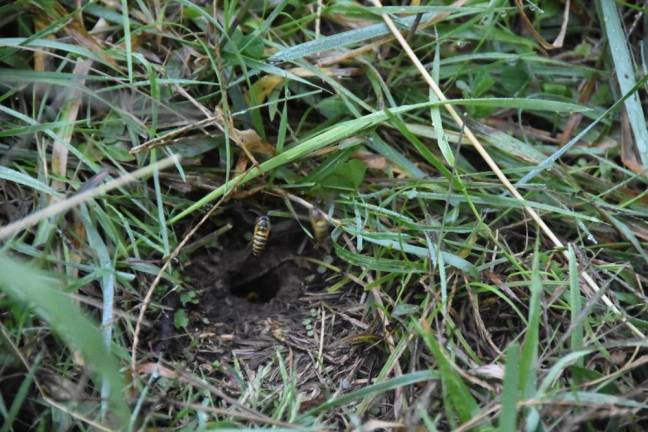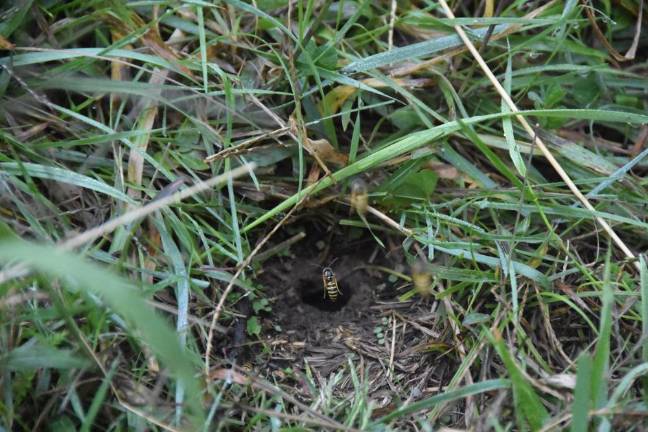The mercenary army in my garden


This morning, I got zapped while picking raspberries, once on the ankle and twice upside the head, above my ear, as if my unruly mop of hair was nothing but peach fuzz. I swore under my breath and hustled out of garden one, to the less intimidating terra firma of garden two. This is only the second time I’ve gotten zinged this season, though I’m in that garden almost every day, often in my underwear. The stings were less painful this time – presumably I’m building tolerance? – but it did feel like a breach of etiquette.
I’d thought we had come to an understanding since that first encounter, the yellow jackets and I. I give their nest a wide berth and they grant me special-visitor status. Maybe the wasps were grumpy today because it was raining. Because it was Monday? They’re hungry? They’re raising up their new queen this time of year?
We know exactly where they are. We can see the hole where they’re nesting in the ground – an active thoroughfare, though no one stands around long to watch. Dion, 4, has been stung three times this season, once on his poor little bum right through his sweatpants. He doesn’t venture into “wasp garden” anymore. Husband Joe also got stung thrice – all at once – while weeding. He steers clear now, too. Joe’s stings swelled his wrist and eye up, even after a dose of Benadryl.
Joe wants to go out there at night, stick the garden hose into the burrow and be done with it. I get it. Gardening is more pleasant when you’re not being injected by venom, or watching your back in perpetual fear of the possibility. Does anyone actually likes wasps? Unlike bees, they can sting at will, without dying in kamikaze glory – and they do. I wouldn’t call myself a fan.
I’ve held him off, though. Because even as my stings take to throbbing, then itching, here’s the thing: it’s been a really great garden year, our best ever. Do the wasps have a part to play in that? I’d wager yes.
I know weirdly little about wasps, but here is what I gather. Adult wasps subsist on fruit and nectar, and feed their larvae a meat-lover’s diet: insects and spiders, grubs and cabbage worms. Could they also be eating lanterflies, the invasive doomsday bug du jour that laid waste to our garden last year? My guess is definitely.
The lanternflies are still around, still colonizing the grape vines and munching the young fruit trees, but something is keeping them from decimating on the same scale – and it’s not me. Those pretty devils are so quick and hard to squash, I miss my target four times out of five. Yet somehow, some way, biocontrol is figuring itself out.
One more argument in favor of the villains: those nasty yellow jacket stings may be the best thing in the world for us. Scientists are studying whether wasp venom could have “anticancer, antimicrobial, neuroprotective, anti-inflammatory and antioxidant effects” – and it’s not some internet wormhole but the National Institute of Health where you can find the latest.
Sometimes, you have no real choice but to kill: when wasps set up shop under the playground, mice poop in your kitchen drawers, or predators get into the chicken coop in broad daylight and you know they’ll be back.
But sometimes, you do have a choice – and the better choice just might be to let well enough alone. Like this summer, at a vacation house, I watched a slow-motion mess unfold, beginning with the bludgeoning of the “scary” black snakes in the rock wall outside and evolving, inevitably, into a war against the invasion of the mice, which are by far the more legitimate threat to human safety. The connection was not a complicated one if you’re paying attention, but we’ve gotten pretty abysmal at that.
By the time you read this, the wasps will be gone. They die off as the weather turns, leaving the new fertilized queen, or foundress, to hibernate alone. Talk about lonely at the top. But the conundrum remains, mankind’s perpetual enigma: When is the time to pull out the big guns?
What if we reversed the order of our kneejerk instinct to kill first, ask questions later? What if, upon encountering something unpleasant, we asked questions first? What if we made it our default to observe, and from there, begin to hypothesize about how it all fits together? It would put a dent in the number of Netflix shows you were able to discuss with fluency, but it might be almost as interesting.
If the wasps eat the lanternflies, and the lanternflies eat the fruit trees, do we still want to kill the wasps? If wasp venom really turns out to punch holes in cancer cells – well, what then?
We may yet drag out the garden hose for a twilight offensive. I’m not ruling it out, if the colony grows massive or gets more aggressive next year, or Joe’s allergy turns full-blown. (Exterminator websites put the fear of God in you. “They can instantly multiply,” says one. “Ground hornet nests can be extremely troublesome and can quickly turn into an intractable problem if left untreated.”)
But I’m not messing with that garden alchemy unless I absolutely have to.